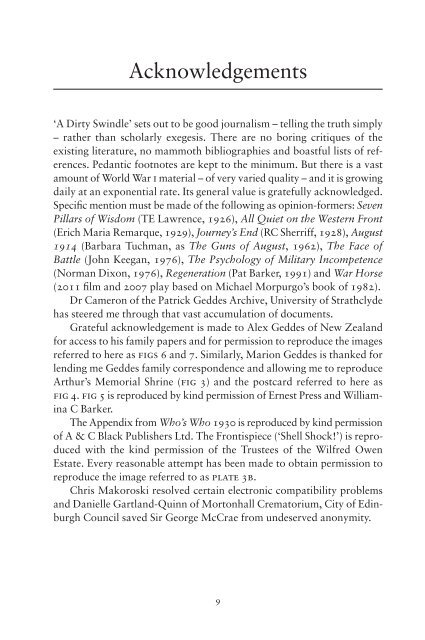A Dirty Swindle by Walter Stephen sampler
Walter Stephen provides an uninhibited look at the misery and toil of World War I through a collection of twelve stories. Providing a Scottish perspective, he takes a look at reports from home and abroad with scepticism, delving deeper to unveil the unencumbered truth. Recalling Siegfried Sassoon’s words, Stephen reveals the failures of those in command as the Great War became known as A Dirty Swindle. The varied accounts chronicle the progress of troops from recruitment to training to the frontline, as well as revealing a side of Field Marshal Haig never seen before.
Walter Stephen provides an uninhibited look at the misery and toil of World War I through a collection of twelve stories. Providing a Scottish perspective, he takes a look at reports from home and abroad with scepticism, delving deeper to unveil the unencumbered truth.
Recalling Siegfried Sassoon’s words, Stephen reveals the failures of those in command as the Great War became known as A Dirty Swindle. The varied accounts chronicle the progress of troops from recruitment to training to the frontline, as well as revealing a side of Field Marshal Haig never seen before.
You also want an ePaper? Increase the reach of your titles
YUMPU automatically turns print PDFs into web optimized ePapers that Google loves.
Acknowledgements<br />
‘A <strong>Dirty</strong> <strong>Swindle</strong>’ sets out to be good journalism – telling the truth simply<br />
– rather than scholarly exegesis. There are no boring critiques of the<br />
existing literature, no mammoth bibliographies and boastful lists of references.<br />
Pedantic footnotes are kept to the minimum. But there is a vast<br />
amount of World War i material – of very varied quality – and it is growing<br />
daily at an exponential rate. Its general value is gratefully acknowledged.<br />
Specific mention must be made of the following as opinion-formers: Seven<br />
Pillars of Wisdom (TE Lawrence, 1926), All Quiet on the Western Front<br />
(Erich Maria Remarque, 1929), Journey’s End (RC Sherriff, 1928), August<br />
1914 (Barbara Tuchman, as The Guns of August, 1962), The Face of<br />
Battle (John Keegan, 1976), The Psychology of Military Incompetence<br />
(Norman Dixon, 1976), Regeneration (Pat Barker, 1991) and War Horse<br />
(2011 film and 2007 play based on Michael Morpurgo’s book of 1982).<br />
Dr Cameron of the Patrick Geddes Archive, University of Strathclyde<br />
has steered me through that vast accumulation of documents.<br />
Grateful acknowledgement is made to Alex Geddes of New Zealand<br />
for access to his family papers and for permission to reproduce the images<br />
referred to here as figs 6 and 7. Similarly, Marion Geddes is thanked for<br />
lending me Geddes family correspondence and allowing me to reproduce<br />
Arthur’s Memorial Shrine (fig 3) and the postcard referred to here as<br />
fig 4. fig 5 is reproduced <strong>by</strong> kind permission of Ernest Press and Williamina<br />
C Barker.<br />
The Appendix from Who’s Who 1930 is reproduced <strong>by</strong> kind permission<br />
of A & C Black Publishers Ltd. The Frontispiece (‘Shell Shock!’) is reproduced<br />
with the kind permission of the Trustees of the Wilfred Owen<br />
Estate. Every reasonable attempt has been made to obtain permission to<br />
reproduce the image referred to as plate 3b.<br />
Chris Makoroski resolved certain electronic compatibility problems<br />
and Danielle Gartland-Quinn of Mortonhall Crematorium, City of Edinburgh<br />
Council saved Sir George McCrae from undeserved anonymity.<br />
9


















